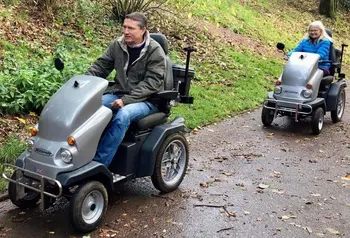
National Lottery Grants for Heritage – £10,000 to £250,000
In this 18-month pilot project, Sense collaborated with the National Trust to help people who are deafblind or have complex disabilities to connect with nature in National Trust gardens in the west midlands.
15 workshops and sensory walks took place across five properties, engaging 109 disabled people who use Sense services and 613 National Trust visitors. Using wearable midisprout technology participants learned about plants in a tactile way. Conductive pads placed on people’s skin measured changes in electrical currents on plants’ leaves and converted this into music and vibrations.
The culmination of the project was two interactive soundscape installations at Wightwick Manor and Croome. Over 430 people listened to midisprout recordings of plants and audio of experiences of staff and workshop participants. People also had the opportunity to use the technology themselves and were encouraged to think about how deafblind people navigate the world through touch.

Our funding also supported:
- lasting partnerships between Sense, the National Trust, freelancers and sound artists
- 79 National Trust staff and volunteers across three sites receiving deafblind communication awareness training
- easy read maps of the gardens and British Sign Language leaflets for each location
A Sense staff member said: “It helps people feel more comfortable being on a heritage site, connecting with nature in a heritage setting. And that’s obviously a bonus, it’s something you can build on as well.”
The project developed inclusive methods of evaluating their project. Traditional evaluation techniques like surveys or interviews rely on verbal or written communication, and often exclude people with complex disabilities. Alex Kaley from Lancaster University was commissioned to develop evaluation methods that capture non-verbal, sensory, neurodiverse and tactile experiences.


